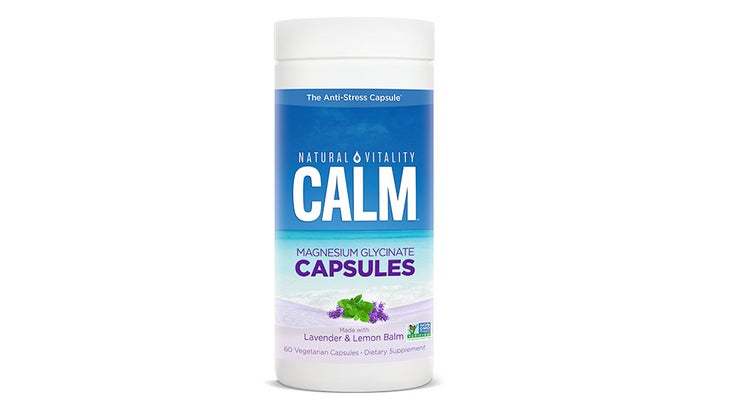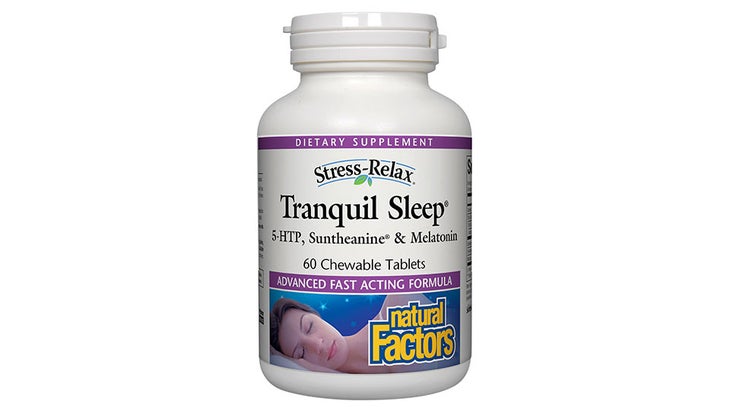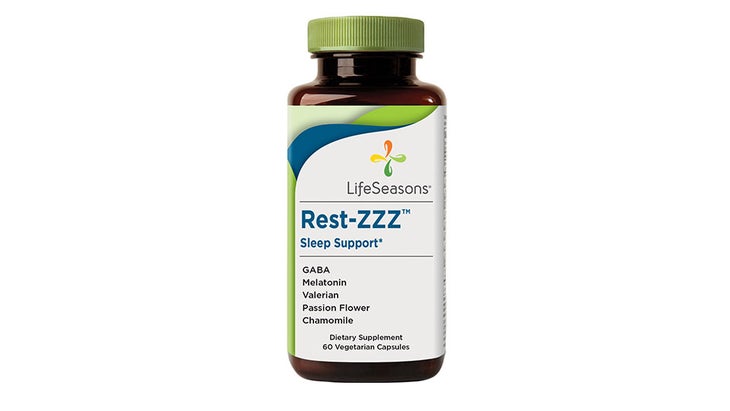Top 8 Effective Sleep Supplements
8 science-backed supplements to help you sleep.
Get full access to Outside Learn, our online education hub featuring in-depth nutrition, fitness and adventure courses, and more than 2,000 instructional videos when you sign up for Outside+..
Tossing and turning all night? You’re not alone. As many as 70 million Americans suffer from sleep disorders, and roughly half of all adults experience occasional bouts of insomnia. That’s a problem: studies link lack of sleep with increased risk of heart disease, depression, Alzheimer’s disease, and other health issues. Reduce your risk, and get ready to crash, with these supplements that guarantee you’ll snooze.
1. Melatonin
A hormone naturally produced by the pineal gland, signals your brain that it’s time to snooze. The production and release of melatonin are driven by the circadian clock, so levels are naturally higher in the evening and lower in the morning. As we age, the body produces less melatonin—one reason why older people have difficulty sleeping—and several studies show that melatonin can improve insomnia in the elderly. Taking melatonin also helps regulate sleep in those who work night shifts or are experiencing jet lag. Studies show that 2–5 mg of melatonin can significantly increase total sleep time, shorten the time it takes to fall asleep, and improve overall quality of sleep. Some research suggests that time-release formats are the most effective.
2. Magnesium
Has a calming effect on the nervous system, and insufficient levels of magnesium have been linked to insomnia and sleep disturbances, as well as depression—one key factor in restless sleep. It’s thought to work in part by regulating circadian rhythms, ensuring regular and tranquil sleep, and by decreasing cortisol, the main stress hormone.
Some research also suggests that magnesium helps regulate melatonin production and influences brain levels of GABA, a neurotransmitter that’s associated with relaxation. Several studies show that taking magnesium before bed can reduce the time it takes to fall asleep and reduce nighttime waking.
Did You Know?
Studies show that taking magnesium before bed can reduce the time it takes to fall asleep.
3. Lavender
A flowering plant prized for its volatile oils, has long been used to promote calm and sleep. It’s high in compounds thought to reduce anxiety by interacting with
neurotransmitters and the parasympathetic nervous system, the part associated with rest versus activity. In one study, an essential oil extract of lavender was more effective than placebo in treating anxiety, and those who used lavender oil showed significant improvements in sleep duration, sleep quality, and the length of time it took to fall asleep.
4. Valerian
A perennial herb used for centuries to treat anxiety, stress, and insomnia, is rich in valerenic acids and valepotriates—compounds that are thought to promote sleep by influencing GABA and serotonin. Studies show that 300–900 mg of valerian taken before bed can shorten the time it takes to fall sleep, increase total sleep time, reduce nighttime waking, and improve subjective sleep quality. In one study, valerian worked as well as oxazepam, a prescription drug for insomnia and anxiety.
5. Lemon balm
A member of the mint family, is traditionally used to reduce stress and enhance sleep. It’s rich in a variety of active components, including flavonoids, polyphenolic compounds, and others, that are thought to influence GABA and impact other neurotransmitters to promote a sedative and calming effect. Studies show that lemon balm can calm anxiety and stress, decrease restlessness, and promote sleep. It may be most effective when used with valerian—some studies show that a combination of valerian and lemon balm significantly improved quality of sleep without causing morning drowsiness or “hangover.”
6. 5-HTP
(5-hydroxytryptophan) is naturally produced by the body from tryptophan as a step in the process of making serotonin. It’s also indirectly involved in the production of melatonin. Because 5-HTP is effective at easing anxiety and improving mood, it may be especially helpful for insomnia related to anxiety or depression. Other studies suggest that 5-HTP can treat symptoms of fibromyalgia, a condition that causes chronic pain and is often linked with sleep disturbances. Other studies suggest that 5-HTP may be especially effective when combined with GABA; one study found that the combination shortened the time it took to fall asleep and increased sleep duration.
7. Curcumin
The active compound in turmeric root, can promote sleep in several ways. Research suggests that up to 88 percent of people with chronic pain also have sleep disorders, and at least half of all people with insomnia suffer from chronic pain. Studies show that curcumin can ease arthritis and other kinds of pain frequently linked with disturbed sleep. Curcumin may also be effective in treating depression and anxiety, important if sleeplessness is caused by mood disorders.
8. L-theanine
An amino acid found in green tea, can reduce stress and anxiety, promote relaxation, ease depression, and encourage sleep. Several studies suggest that L-theanine can improve insomnia and enhance self-reported sleep satisfaction. It may be especially useful for encouraging sleep in people with certain psychiatric or cognitive disorders. In one study, 400 mg of L-theanine was shown to be safe and effective in improving sleep quality in boys diagnosed with ADHD. Other studies show that a combination of L-theanine and GABA decreased the time it took to fall asleep and improved sleep quality and duration better than either supplement alone.
Sleep Supplements



References:
https://my.clevelandclinic.org/health/articles/11429-common-sleep-disorders
https://onlinelibrary.wiley.com/doi/full/10.1046/j.1365-2869.2001.00256.x?sid=nlm%3Apubmed
https://www.ncbi.nlm.nih.gov/pmc/articles/PMC4273450/
https://www.ncbi.nlm.nih.gov/pubmed/11828891
https://www.ncbi.nlm.nih.gov/pmc/articles/PMC3656905/
https://www.ncbi.nlm.nih.gov/pmc/articles/PMC4523676/
https://onlinelibrary.wiley.com/doi/full/10.1111/j.1600-079X.2011.00962.x
https://www.ncbi.nlm.nih.gov/pubmed/23515203
https://www.ncbi.nlm.nih.gov/pubmed/12959951
https://www.ncbi.nlm.nih.gov/pubmed/21091391
https://www.ncbi.nlm.nih.gov/pmc/articles/PMC6212970/
https://www.ncbi.nlm.nih.gov/pubmed/27074515
https://www.jabfm.org/content/28/2/249.short
https://www.ncbi.nlm.nih.gov/pubmed/23969766
https://www.ncbi.nlm.nih.gov/pubmed/25540137
https://www.ncbi.nlm.nih.gov/pubmed/12030424
https://www.ncbi.nlm.nih.gov/pubmed/18799816
https://www.ncbi.nlm.nih.gov/pmc/articles/PMC3703169/
https://www.ncbi.nlm.nih.gov/pubmed/19715722
https://www.ncbi.nlm.nih.gov/pubmed/19630576
https://www.ncbi.nlm.nih.gov/pubmed/15663184
https://www.ncbi.nlm.nih.gov/pubmed/16053244
https://www.ncbi.nlm.nih.gov/pubmed/20965131
https://www.ncbi.nlm.nih.gov/pmc/articles/PMC2908021/
https://www.ncbi.nlm.nih.gov/pmc/articles/PMC3612440/
https://www.ncbi.nlm.nih.gov/pubmed/30825591
https://www.ncbi.nlm.nih.gov/pubmed/27095995
https://www.ncbi.nlm.nih.gov/pubmed/16298774
https://www.ncbi.nlm.nih.gov/pubmed/16520572
https://www.ncbi.nlm.nih.gov/pubmed/16131287/
https://www.ncbi.nlm.nih.gov/pmc/articles/PMC6007527/
https://www.ncbi.nlm.nih.gov/pmc/articles/PMC4523676/
https://www.ncbi.nlm.nih.gov/pubmed/20628685
https://www.ncbi.nlm.nih.gov/pubmed/17145239
https://www.ncbi.nlm.nih.gov/pubmed/20347389
https://www.ncbi.nlm.nih.gov/pubmed/12587994
https://www.ncbi.nlm.nih.gov/pubmed/17593676
https://www.ncbi.nlm.nih.gov/pubmed/16444660
https://www.ncbi.nlm.nih.gov/pmc/articles/PMC3560823/
https://www.ncbi.nlm.nih.gov/pubmed/20347389/
https://www.amjmed.com/article/S0002-9343(06)00275-0/fulltext
https://www.ncbi.nlm.nih.gov/pubmed/12568976
https://www.ncbi.nlm.nih.gov/pmc/articles/PMC4384870/
https://www.ncbi.nlm.nih.gov/pubmed/22529473
https://www.ncbi.nlm.nih.gov/pubmed/29908682
https://www.ncbi.nlm.nih.gov/pubmed/23653088
https://www.ncbi.nlm.nih.gov/pubmed/12559480
https://www.ncbi.nlm.nih.gov/pubmed/21178946
https://www.ncbi.nlm.nih.gov/pubmed/18712364?dopt=Abstract
https://www.ncbi.nlm.nih.gov/pubmed/26921634
https://www.ncbi.nlm.nih.gov/pubmed/14706720
https://www.cochranelibrary.com/cdsr/doi/10.1002/14651858.CD003383/abstract
https://jamanetwork.com/journals/jama/article-abstract/186893
https://www.ncbi.nlm.nih.gov/pubmed/15700178
https://www.ncbi.nlm.nih.gov/pubmed/21034404
https://www.ncbi.nlm.nih.gov/pmc/articles/PMC4523676/
https://www.ncbi.nlm.nih.gov/pubmed/19090505
https://www.ncbi.nlm.nih.gov/pubmed/11536390
https://www.ncbi.nlm.nih.gov/pubmed/21219501
http://www.fao.org/3/a-i5770e.pdf
https://www.ncbi.nlm.nih.gov/pubmed/16459140
https://www.ncbi.nlm.nih.gov/pubmed/15033151
https://www.ncbi.nlm.nih.gov/pubmed/17326547
https://www.jpain.org/article/S1526-5900(13)01199-1/fulltext
https://www.ncbi.nlm.nih.gov/pubmed/12531004
https://www.ncbi.nlm.nih.gov/pmc/articles/PMC2929771/
https://www.ncbi.nlm.nih.gov/pubmed/28236605
https://www.ncbi.nlm.nih.gov/pmc/articles/PMC5664031/
https://www.ncbi.nlm.nih.gov/pubmed/18040064
https://link.springer.com/article/10.1007%2Fs11154-014-9304-x
https://www.ncbi.nlm.nih.gov/pubmed/27694409
https://www.ncbi.nlm.nih.gov/m/pubmed/30580081/?i=3&from=l-theanine%20sleep
https://www.ncbi.nlm.nih.gov/pmc/articles/PMC6366437/
https://www.ncbi.nlm.nih.gov/pubmed/15378679